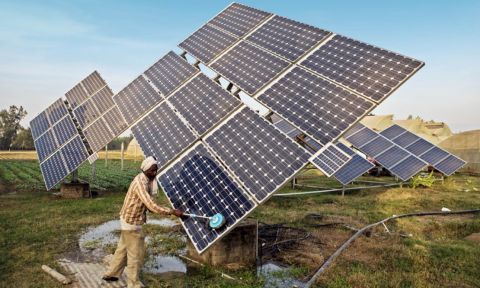
2022 Global food policy report: Climate change and food systems
Climate change threatens our food systems and the multiple development goals linked to sustainable food system transformation. Action is urgently needed, both to increase adaptation and resilience and to achieve major emissions reductions. Current efforts must be stepped up and greatly expanded to ensure food security, nutrition, and well-being for all in the years to come. The 2022 Global Food Policy Report showcases opportunities for accelerating innovation, reforming policies, resetting market incentives, and increasing financing for sustainable food systems transformation, as well as promoting healthy diets and building resilience.
Chapter 1 Climate Change and Food Systems: Transforming Food Systems for Adaptation, Mitigation, and Resilience [download]
Johan Swinnen, Channing Arndt, and Rob Vos | Pages 6-15
Chapter 2 Repurposing Agricultural Support: Creating Food Systems Incentives to Address Climate Change [download]
Rob Vos, Will Martin, and Danielle Resnick | Pages 16-27
Chapter 3 Trade and Climate Change: The Role of Reforms in Ensuring Food Security and Sustainability [download]
Joseph W. Glauber | Pages 28-37
Chapter 4 Research for the Future: Investments for Efficiency, Sustainability, and Equity [download]
Gert-Jan Stads, Keith Wiebe, Alejandro Nin-Pratt, Timothy B. Sulser, Rui Benfica, Fasil Reda, and Ravi Khetarpal | Pages 38-47
Chapter 5 Climate Finance: Funding Sustainable Food Systems Transformation [download]
Eugenio Díaz-Bonilla and Ruben Echeverría | Pages 48-57
Chapter 6 Social Protection: Designing Adaptive Systems to Build Resilience to Climate Change [download]
Daniel O. Gilligan, Stephen Devereux, and Janna Tenzing | Pages 58-63
Chapter 7 Landscape Governance: Engaging Stakeholders to Confront Climate Change [download]
Ruth Meinzen-Dick, Wei Zhang, Hagar ElDidi, and Pratiti Priyadarshini | Pages 64-71
Chapter 8 Nutrition and Climate Change: Shifting to Sustainable Healthy Diets [download]
Marie T. Ruel and Jessica Fanzo | Pages 72-81
Chapter 9 Rural Clean Energy Access: Accelerating Climate Resilience [download]
Claudia Ringler, Alebachew Azezew Belete, Steven Matome Mathetsa, and Stefan Uhlenbrook | Pages 82-89
Chapter 10 Bio-innovations: Genome-Edited Crops for Climate-Smart Food Systems [download]
José Falck-Zepeda, Patricia Biermayr-Jenzano, Maria Mercedes Roca, Ediner Fuentes-Campos, and Enoch Mutebi Kikulwe | Pages 90-99
Chapter 11 Food Value Chains: Increasing Productivity, Sustainability, and Resilience to Climate Change [download]
Alan de Brauw and Grazia Pacillo | Pages 100-105
Chapter 12 Digital Innovations: Using Data and Technology for Sustainable Food Systems [download]
Jawoo Koo, Berber Kramer, Simon Langan, Aniruddha Ghosh, Andrea Gardeazabal Monsalue, and Tobias Lunt | Pages 106-113
REGIONAL DEVELOPMENTS [download] Jemimah Njuki, Samuel Benin, Wim Marivoet, John Ulimwengu, Caroline Mwongera, Clemens Breisinger, Amgad Elmahdi, Yumna Kassim, Nicostrato Perez, Kamiljon Akramov, Kahramon Djumaboev, Roman Romashkin, Aditi Mukherji, Avinash Kishore, Shahidur Rashid, Kevin Chen, Yue Zhan, Eugenio Díaz-Bonilla, Carolina Navarrete-Frias, Valeria Piñeiro | Pages 114-145
Projections from IFPRI's IMPACT model: Climate change and food systems [download]
International Food Policy Research Institute (IFPRI)| Pages 146-161

